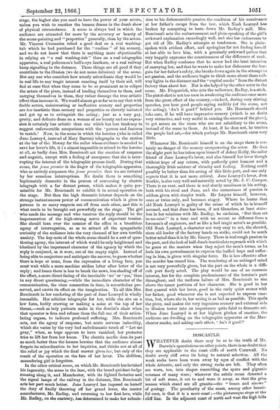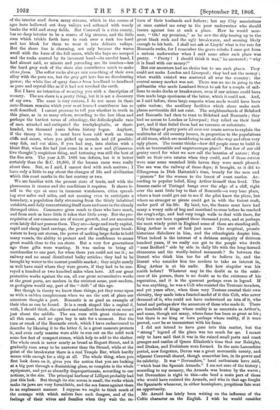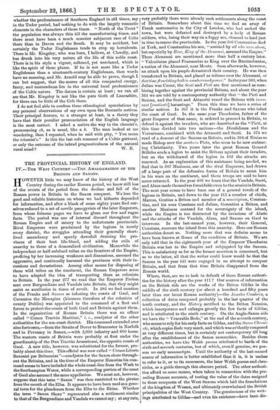BOSCASTLE.
WHATEVER doubt there may be as to the truth of Mr. Darwin's speculations on other points, there is no doubt that they are applicable to the coast cliffs of north Cornwall. No doubt every cliff owes its being to natural selection. All the weak rocks have been worn away by ages of conflict with the whole Atlantic, and only the strong rocks are left. They often are worn, too, into shapes resembling the spare and gigantic veterans of many wars ; wherever the subtle ocean detected a bit of soft stone, it set to and wore it away, so that the grim masses which stand are all granite—the " bones and sinews " of geology. The peculiarity of the coast, among other beauti- ful ones, is that it is a mere coast ; —the picturesque stops at the cliff line. In the adjacent coast of north and west the high hills of the interior send down many streams, which in the course of ages have hollowed out deep valleys and softened with woody banks the wild and stony fields, But Cornwall is a thin county, has no deep interior to be .a source of big streams, and the little ones which trickle forth have to rush over a rock too hard and too bleak for them to wear it into delicate valleys. But the shore line is charming, not only because the waves swell with the force of the full ocean, while the bays are scooped and the rocks scarred by its incessant hand—its careful hand, I had almost said, so minute and pervading are its touches—but the hard grey rock of the shore also contributes much to make clean foam. The softer rocks always mix something of their own alloy with the pure sea, but the grey grit here has no discolouring power; the white line of spray dances from headland to headland as pure and crystal-like as if it had not touched the earth.
But I have no intention of wearying you with a description of scenery. The sea shore is a pretty thing, but it is not a discovery of my own. The coast is very curious, I do not mean in those ante-Roman remains which your most learned contributor has so well described. I cannot presume to tell you whether in truth in this place, as in so many others, according to the last ideas and perhaps the hardest terms of ethnology, the dolicokephalic race of men attacked and extirpated the trachykephalic, or short- headed, ten thousand years before history began. Anyhow, if the theory is true, it must have been cold work on these cliffs and moors, when you picked up mussels and (if possible) cray fish, and cut skins, if you had any, into clothes with a blunt flint, when fire had just come in as a new and (Conserva- tive thought !) suspicious thing, and tattooing was still the best of the fine arts. The year A.D. 1866 has defects, but it is better certainly than the B.C. 18,660, if the human races were really about then. But, as I said, I cannot deal with such matters ; I have only a little to say about the changes of life and civilization which this coast marks in the last century or two.
We are familiar with the present state of trade, and with the phenomena it creates and the conditions it requires. It shows it- self to the eye at once in immense warehouses, cities spread- ing over miles and miles, and not seeming even to anticipate a boundary, a population daily streaming from the thinly inhabited outskirts, and daily concentrating itself more and more in the already thronged cities. Commerce gives much to those who have much, and from such as have little it takes that little away. But the pre- requisites of our commerce are of recent growth, and our ancestors even lately did not possess them. They are—large and ready capital, rapid and cheap land carriage, the power of making great break- waters to keep out storms, the power of making large docks to bold many vessels, the ability to protect and the confidence to amass great wealth close to the sea shore. But a very few generations ago these gifts were wanting. It was useless to bring all merchandise to one port, for when there you could not use it ; no railway and no canal distributed bulky articles ; they had to be brought by water to the nearest possible market ; they might nearly as well have staid where they were grown, if they had to be con- veyed a hundred or two hundred miles when here. All our great protective works against the sea, all our great accumulative works at the great ports, are modern in the strictest sense, post-modern, as geologists would say, part of the " drift " of this age.
But though in theory we know these things, yet they come upon us with a sudden completeness when we see the sort of place our ancestors thought a port. Boscastle is as good an example of their idea as can be found. It is a creek shaped like a capital S, with, I should think, the earliest and smallest breakwater on record just about the middle. The sea runs with great violence on all this coast, and no open bay is safe for a moment. But the turn or crook of the Boscastle creek, which I have endeavoured to describe by likening it to the letter S, in a great measure protects it, and even early masons were able to run out on the solid rock some few feet of compact stones, which help to add to the shelter. The whole creek is never nearly as broad as Regent Street, and it gradually runs away to be narrower than the Strand, while at the point of the breakwater there is a real Temple Bar, which hardly seems wide enough for a ship at all. The whole thing, when you first look down on it, gives you the notion that you are looking at a big port through a diminishing glass, so complete is the whole equipment, and yet so absurdly disproportionate, according to our notions, is the size. The principal harbour of Lilliput probably had just this look. But though its size across is small, the rocks which make its jaws are very formidable, and the sea foams against them in an unpleasant manner. I suppose we ought to think much of the courage with which sailors face such dangers, and of the feelings of their wives and families when they wait the re- turn of their husbands and fathers ; but my City associations at once carried me away to the poor underwriter who should insure against loss at such a place. How he would mur- mur, " Oh ! my premium," as he saw the ship tossing up to the great black rock and the ugly breakwater, and seeming likely enough to hit both. I shall not ask at Lloyds' what is the rate for Boscastle rocks, for I remember the grave rebuke I once got from a serious underwriter when I said some other such place was pretty. " Pretty ! I should think it was," he answered ; " why it is lined with our money!"
But our ancestors had no choice but to use such places. They could not make London and Liverpool ; they had not the money ; what wealth existed was scattered all over the country; the central money market was not. There was no use in going to the goldsmiths who made Lombard Street to ask for a couple of mil- lions to make docks or breakwaters, even if our science could have then made large specimens of the latter, which it could not. And, as I said before, these large emporia when made would have been quite useless ; the auxiliary facilities which alone make such places serviceable did not exist. The neighbourhoods of Bideford and Boscastle had then to trust to Bideford and Boscastle ; they had no access to London or Liverpool ; they relied on their local port, and if that failed them had no resource or substitute.
The fringe of petty ports all over our coasts serves to explain the multitudes of old country houses, in proportion to the populations. of old times, which are mouldering in out-of-the-way and often very ugly places. The tourist thinks—how did people come to build in such an inaccessible and unpicturesque place? But few of our old gentry cared for what we now call the beauties of nature ; they built on their own estates when they could, and if those estates were near some wretched little haven they were much pleased. The sea was the railway of those days; it brought, as it did to. Ellangowan in Dirk Hatterick's time, brandy for the men and " pinners " for the women to the lonest of coast castles. Ac- cording to popular belief, King Arthur himself thus lived. The famous castle of Tintagel hangs over the edge of a cliff, right over the next little bay to that of Boscastle—a very lone place, where a boat could get out to sea if the pilot knew the place, but where no stranger or pirate could get in with the tiniest craft, under peril of his life. By land, too, the Saxon must have had many a weary mile of bog and moorland to cross before he reached the crag's edge, and had very tough walls to deal with there, for thdy have not been repaired these thousand years, and at perhaps the most windy point in England some of them are standing still_ King Arthur is out of luck just now. The sceptical, prosaic historians disbelieve in him, and the ethnologists despise him_ Whatindeed is the interest of a dubious antiquity of thirteen hundred years, if we really can get to the people who dwelt. " near Bedford " side by side in daily life with the long-horned, rhinoceros and the woolly-haired mammoth ? So between the- literati who think him too far off to believe in, and the literati who consider him too modern to take an interest in,. King Arthur is at his nadir. But how singular was his zenith before? Whatever may be the doubt as to the exist- ence of his person, there is no doubt as to the existence of his. reputation, and it is the queerest perhaps even in legend. If he was anything, he was a Celt who resisted the Teutonic invaders, and yet years after, when these very Teutons created their own chivalry, they made into a fancied model of it this Celt, who never dreamed of it, who could not have understood an iota of it, who- bated and perhaps slew the ancestors of those who made it. There are hundreds of kings whose reality is as uncertain as Arthur's, and some, though not many, whose fame has been as great as his ;. but there is no king or hero perhaps whose reality, if it were proved, must be so inconsistent with his fame.
I did not intend to have gone into this matter, but the " strong " legend of the place was too much for me. I meant only to have said that it was in the ruined small ports and coast granges and castles of Queen Elizabeth's time that our Raleighs,. and Drakes, and Frobishers were formed. In the ante-Lancashire period, now forgotten, Devon was a great mercantile county, and' adjacent Cornwall shared, though somewhat less, in its power and its celebrity. It was " Devonshire," local enthusiasts have said, " which beat the Spanish Armada." I am not sure of the history ; according to my memory, the Armada was beaten by the waves ; but Devonshire is right in this—she bred a main part of those who would have resisted the Armada, and who in that age fought. the Spaniards whenever, in either hemisphere, propitious fate sent an opportunity.
Mr. Arnold has lately been writing on the influence of -the Celtic character on the English. I wish he would consider
whether the predominance of Southern England in old times, say in the Tudor period, had nothing to do with the largely romantic elements in the characters of those times. " North of the Trent" the population was always thin till the manufacturing times, and there must have been a much scantier subjacent race of Celts there than in Devon and the South. It may be accident, but certainly the Tudor Englishman tends to crop up hereabouts. There is Mr. Kingsley, who was born, I believe, at Clovelly, and has drunk into his very nature all the life of this noble coast. There is in his style a vigour, softened, yet unrelaxed, which is like the spirit of these places. If he is not more like a Tudor Englishman than a nineteenth-century Englishman, then words have no meaning, and Mr. Arnold may be able to prove, though I can but suggest, that the source of all this compacted energy, fancy, and unsoundness lies in the universal local predominance of the Celtic nature. The datum is certain at least ; we can all see that Mr. Kingsley is not like the pure Goth of Lancashire, for there can be little of the Celt there.
I do not feel able to confirm these ethnological speculations by any personal observations of my own upon the Boscastle natives. Their principal feature, to a stranger at least, is a theory they have that their peculiar pronunciation of the English language is the most correct. I asked a native the way to the chemist's, pronouncing ch, as is usual, like a k. The man looked at me wondering, then I repeated, when he said with pity, "You mean the tchemist's." Is this the last soft remnant of a Celtic guttural, or only the outcome of the inbred pragmaticalness of the natural
































 Previous page
Previous page